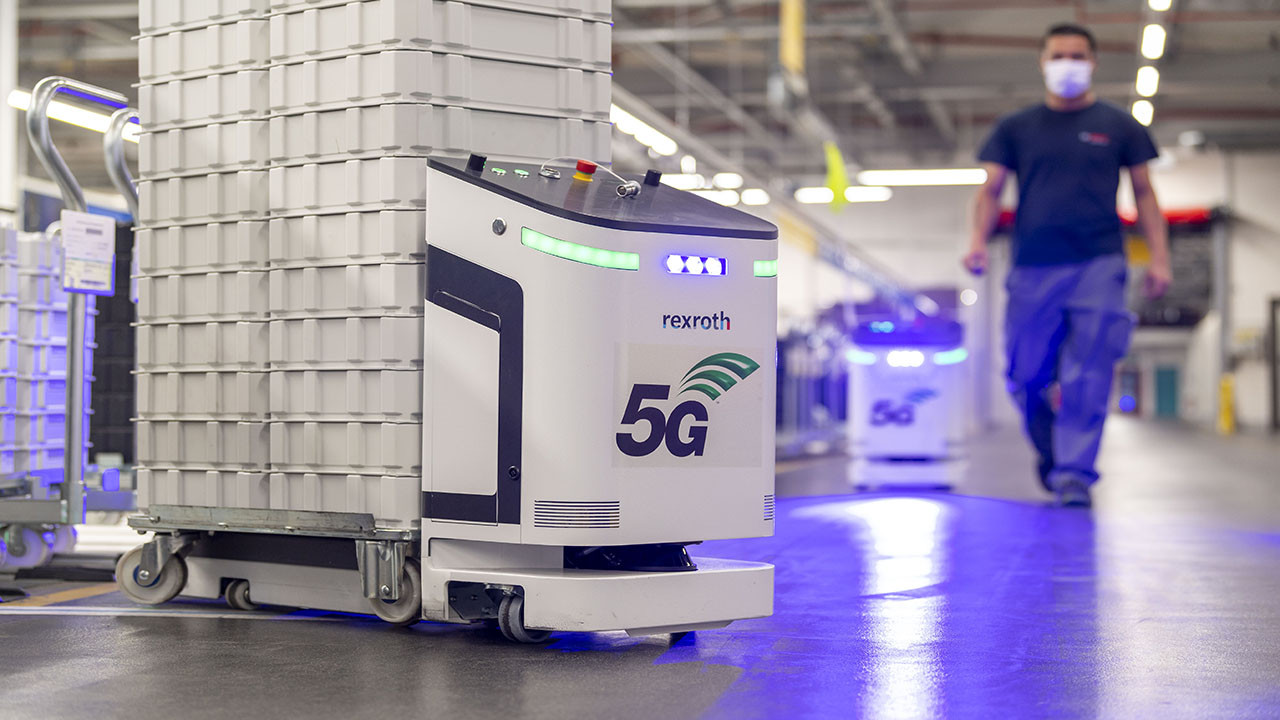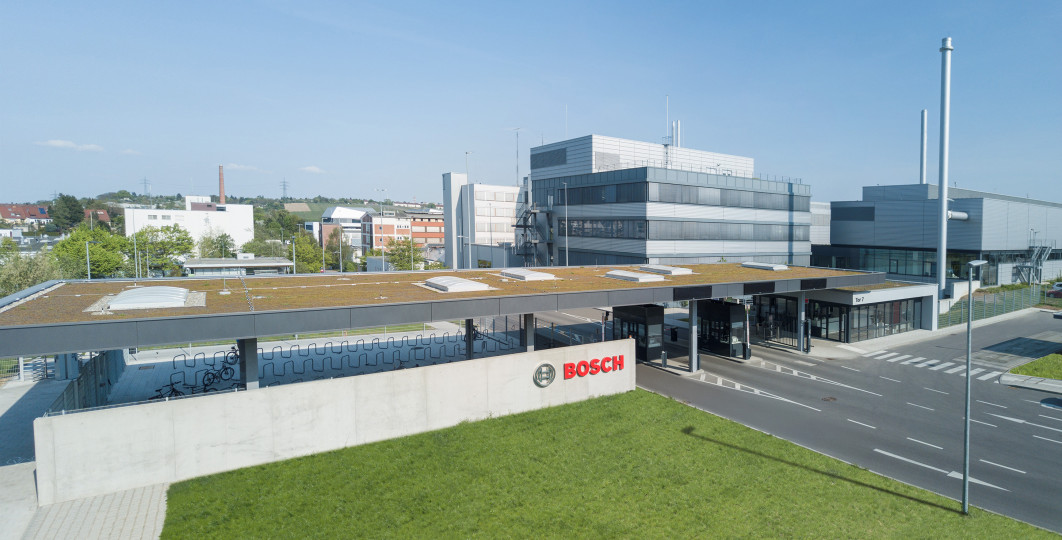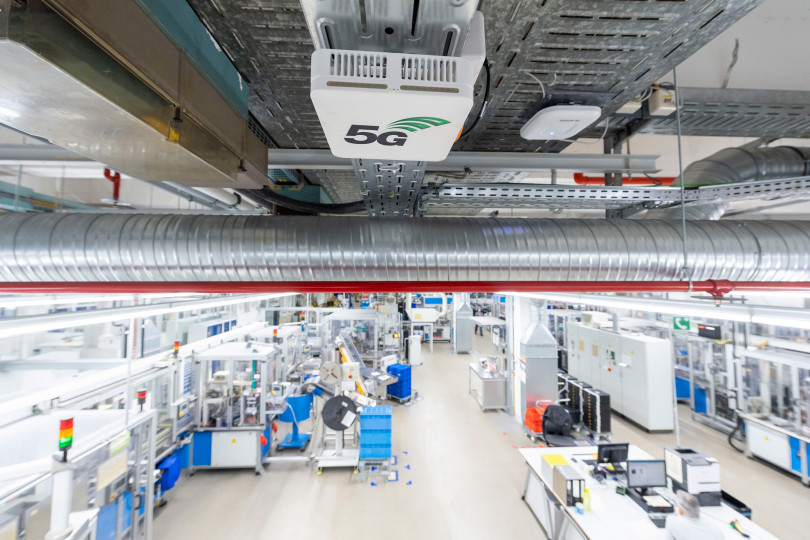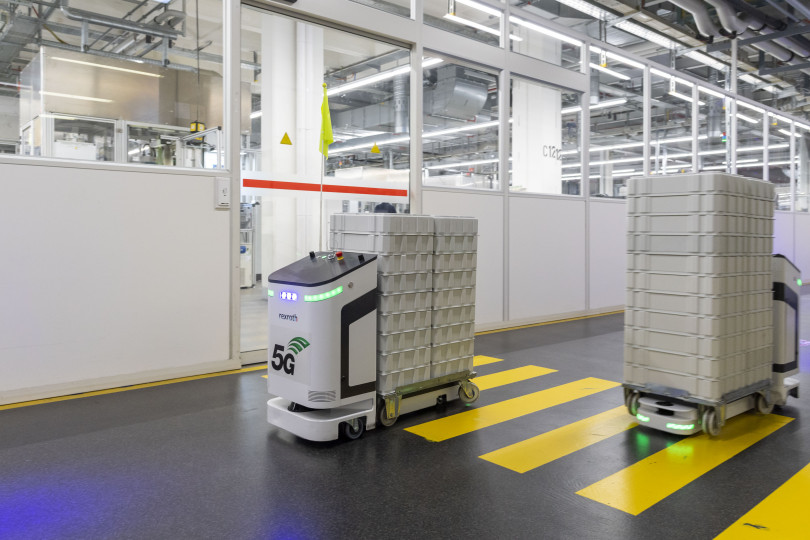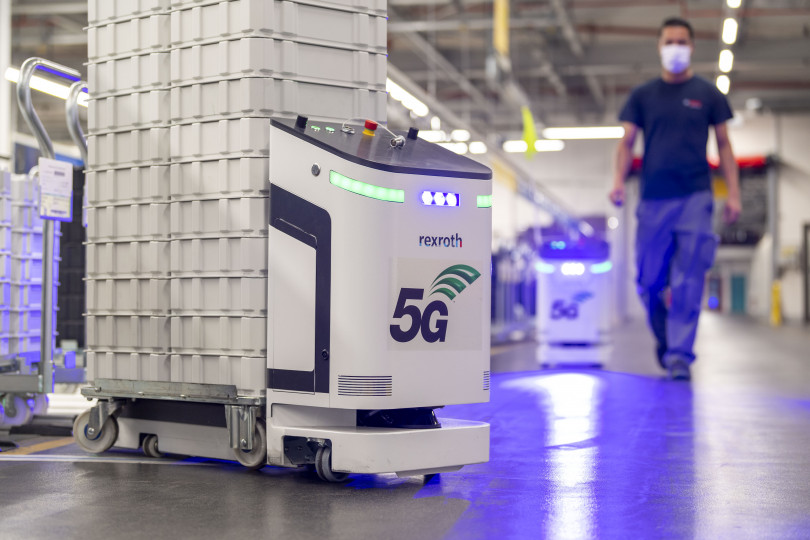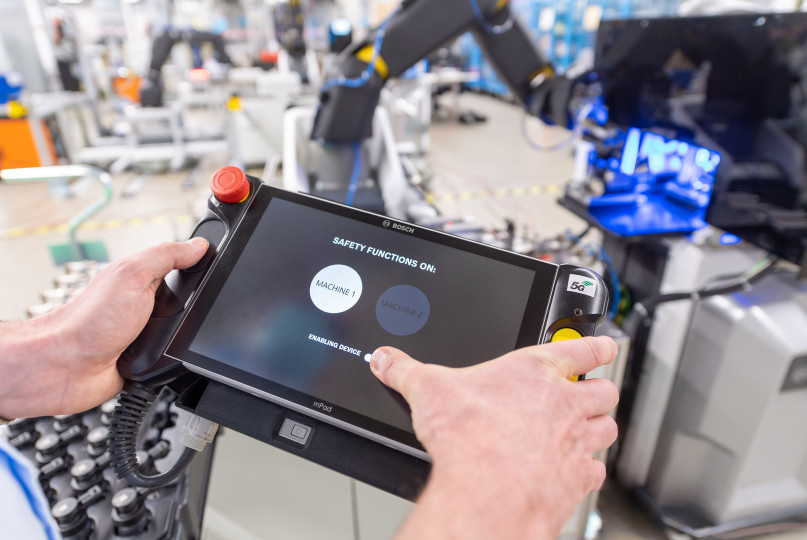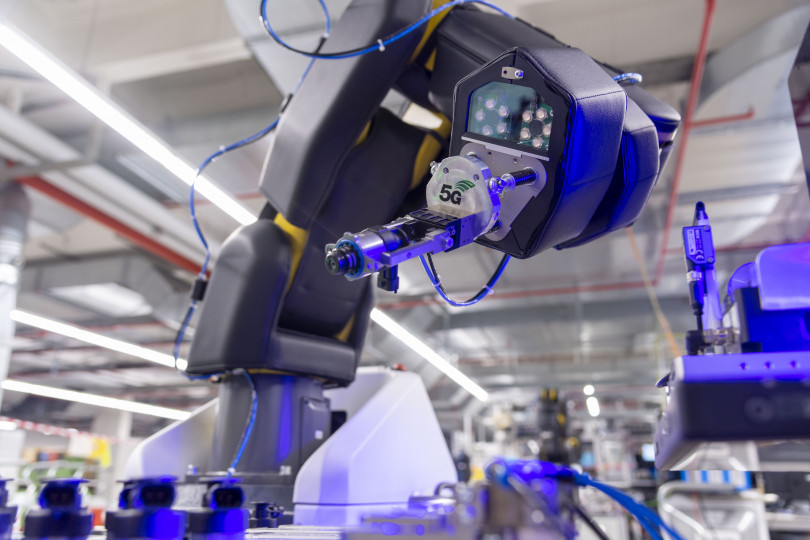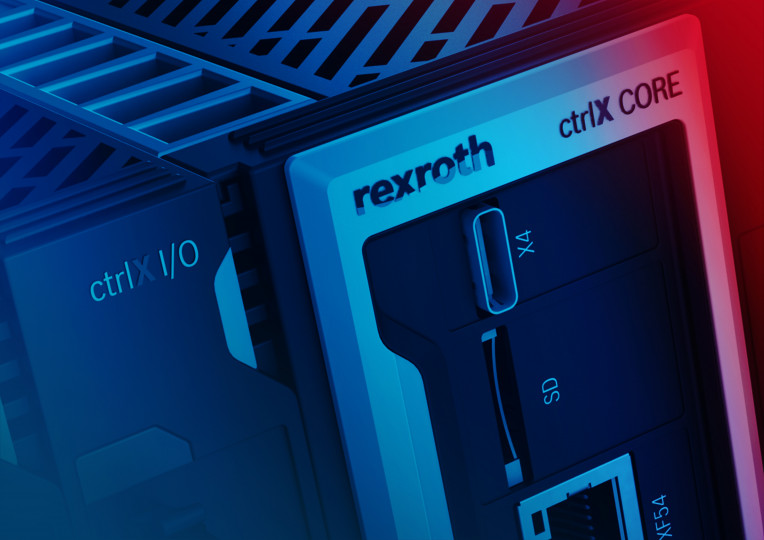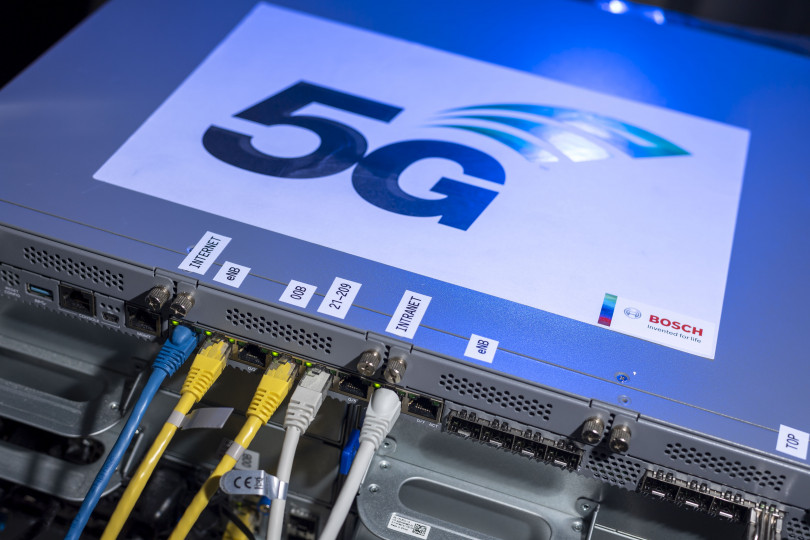Stuttgart, Germany – Bosch is putting its first 5G campus network into operation. At its Industry 4.0 lead plant in Stuttgart-Feuerbach, the company aims to manufacture under previously unheard-of conditions, with data being transferred extremely reliably and ultra-fast, and machines reacting almost instantaneously. For the first time, wireless implementation will be possible for critical applications that require absolute precision and safety. Without exception, people and machines will be able to cooperate safely and without barriers. “5G strengthens our competitiveness and lets us make even more of Industry 4.0’s potential,” says Dr. Michael Bolle, board of management member and CDO/CTO at Bosch. “We will gradually roll 5G out to our roughly 250 plants around the world.” The locations where Bosch will be setting up 5G networks in the coming months include its research campus in Renningen, Germany. The company is also developing 5G-capable products and launching its first solutions for industrial use.
Bosch plant in Stuttgart-Feuerbach is 5G pioneer
The ActiveShuttle moves effortlessly and autonomously over the shop floor, avoids people and vehicles, bypasses storage boxes, steers purposefully toward the production line, stops, unloads its freight, and sets off again. At the Bosch plant in Stuttgart-Feuerbach, the factory of the future is becoming a reality – including 5G applications such as the widespread use of autonomous transport systems. “Campus networks1 are an important building block for Industry 4.0,” Bolle says. One decisive feature is ubiquitous and uninterrupted network coverage. The network can be optimized and tailored to highly demanding industrial applications. In the campus network in Feuerbach, eight small base stations – known as “small cells” – ensure good signal reception throughout the manufacturing facility, which covers around 10,000 square meters. This lets wirelessly connected machines and systems communicate with each other in real time and exchange data within a few milliseconds.
Integrated into the existing IT infrastructure and continuously monitored, the 5G campus network offers a maximum of security and independence. “Campus networks give us control – over what happens in the factory and over how data is transferred both within and beyond the factory walls,” Bolle says. Bosch set up the network together with Nokia. While Bosch defined use cases, Nokia provided 5G components. The two companies are jointly responsible for network planning, operation, and servicing. The pioneering work in Feuerbach is also the setting for an extraordinary symbiosis: Industry 4.0 combined with 5G, optimized with artificial intelligence. As part of KICK, a project funded by the German Federal Ministry of Education and Research, Nokia and other partners are researching how artificial intelligence can simplify the operation and maintenance of 5G campus networks.
Bosch to launch its first 5G-capable products
Anyone looking to seize the potential of the new mobile communications standard in factories needs not just 5G networks but also equipment and machines that interact wirelessly. Bosch is making products 5G-capable. “We have a clear vision of the factory of the future, and how we need to develop our products to meet its requirements. In this context, 5G is a ‘springboard innovation,’ a technology that will fundamentally change the market,” says Rolf Najork, the member of the Bosch board of management responsible for industrial technology. Cap Gemini has found that 65 percent of industrial companies worldwide plan to deploy 5G within the first two years of availability2. Bosch is developing solutions to meet this demand. At the Hannover Messe 2019, the company presented its ActiveShuttle, whose 5G capability and intelligent software allow it to integrate into intralogistics operations smoothly and safely. 5G also plays an important role in control technology. Indeed, Bosch Rexroth’s ctrlX Automation platform was designed for 5G from the outset. “We are forging new paths and bridging the gap between control systems, IT, and the internet of things. Our new control technology will use the new mobile communications standard to connect a wide range of devices,” Najork says.
Bosch sees 5G as a boost for business
5G is making inroads not only into manufacturing industry, but also into healthcare, agriculture, mobility, and urban development. Experts estimate that there will be up to 70 billion connected devices worldwide by 20253, ranging from industrial robots and autonomous cars to sensors that provide information about the nutrient content or moisture level of arable soils. The new mobile communications standard plays a major role in this and is becoming a competitive factor. “We have played an active part in shaping 5G. Bosch started its research into 5G as early as 2014,” Bolle says. These include activities such as 5G NetMobil, a project that shows how to achieve fully connected driving and how modern communications technology can make it safer. Meanwhile, the international 5G-SMART association is investigating the potential effects 5G will have on complex semiconductor production. These findings are being incorporated into the planning of 5G networks, also in Bosch’s new wafer fab in Dresden, which will be ready for 5G from day one. Moreover, Bosch now chairs the 5G-ACIA initiative, whose more than 70 member companies aim to shape 5G so that it meets the needs of manufacturing industry from the outset. As a leading IoT company that offers solutions for connected mobility, the smart home, and connected industry, Bosch sees 5G as a driver of future business.
1 “5G campus network” denotes a geographically limited, local cellular network adapted to meet specific requirements such as industrial communications.
2 See Capgemini: “5G in industrial operations: How telcos and industrial companies stand to benefit”, p. 7.
3 See Roland Berger: „Erfolgsfaktor 5G. Innovation und Vielfalt für die nächste Stufe der Digitalisierung“, p. 11.
Zita Hella Varga
Phone: +36 70 667-6374
Bosch has been present in Hungary since 1898 with its products. After its re-establishment as a regional trading company in 1991, Bosch has grown into one of Hungary’s largest foreign industrial employers with currently nine subsidiaries. In fiscal 2019 it had a total turnover of HUF 1,465 billion and consolidated sales of the Bosch Group on the Hungarian market – not counting trade among its own companies – amounted to HUF 259 billion. The Bosch Group in Hungary employs more than 15,000 associates (as of December 31, 2019). In addition to its manufacturing, commercial and development business, Bosch has a network of sales and service operations that covers the entire country.
The Bosch Group is a leading global supplier of technology and services. It employs roughly 400,000 associates worldwide (as of December 31, 2019). The company generated sales of 77.7 billion euros in 2019. Its operations are divided into four business sectors: Mobility Solutions, Industrial Technology, Consumer Goods, and Energy and Building Technology. As a leading IoT provider, Bosch offers innovative solutions for smart homes, Industry 4.0, and connected mobility. Bosch pursuing a vision of mobility that is sustainable, safe, and exciting. It uses its expertise in sensor technology, software, and services, as well as its own IoT cloud, to offer its customers connected, cross-domain solutions from a single source. The Bosch Group’s strategic objective is to facilitate connected living with products and solutions that either contain artificial intelligence (AI) or have been developed or manufactured with its help. Bosch improves quality of life worldwide with products and services that are innovative and spark enthusiasm. In short, Bosch creates technology that is “Invented for life.” The Bosch Group comprises Robert Bosch GmbH and its roughly 440 subsidiary and regional companies in 60 countries. Including sales and service partners, Bosch’s global manufacturing, engineering, and sales network covers nearly every country in the world. The basis for the company’s future growth is its innovative strength. Bosch employs some 72,600 associates in research and development at 126 locations across the globe, as well as roughly 30,000 software engineers.
Additional information is available online at www.bosch.com, www.iot.bosch.com, www.bosch-press.com, www.twitter.com/BoschPresse

